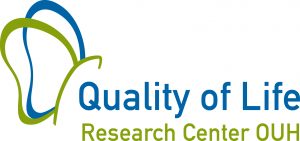Quality of Life Research Center OUH
Quality of Life Research Center OUH Quality of life (QoL) is a rapidly evolving research area within health care and is highly important since QoL captures the burden of diseases at an individual level. From a patient perspective QoL is required to be as optimal as possible throughout all phases of the disease. Also, if managed correctly, QoL data may even be an important future decision making tool when deciding whether or not to implement new, expensive treatments. E.g., assessment of QoL can impact on the conclusions of clinical trials since small treatment effects may be more than outweighed by poorer QoL and the cost of therapy.
Therefore, a new cross-disciplinary and interdisciplinary Quality of Life Research Center has been established at the Department of Haematology, Odense University Hospital. The research center can assist in collection of QoL data at a high level. This requires thorough planning, and the reward is greater yield from the various studies – to the benefit of the patients.
Collection of QoL data
Health care professionals tend to underestimate the effect of side effects and late symptoms following treatment. Assessment of QoL is optimally assessed when patients are asked directly. This can be done via patient reported outcomes (PRO), surveys, interviews and/or participant observations. QoL data can be either primary or secondary endpoints in the clinical trials, and the research center assists in qualifying and handling the collection of QoL data and provides guidance in the description hereof in the study protocol.
For the collection of PRO data, the research center assists in:
- Background generation
- Hypothesis, background and rationale for collecting QoL data
- Methods
- Selection of questionnaires/domains
- Administration of questionnaires
- Hard copy or electronic
- Who is responsible for collecting data
- Where will the data be collected (home, clinic, etc.)
- Handling of missing assessments
- Timing of assessment
- Timeframe of interest
- Time points for data collection
- Time windows for assessing data
- What to bear in mind when patients exit a study
- Define endpoints
- Primary
- Secondary
- Exploratory
- Database construction
- REDCap (hosted by OPEN), MyJourney (OUH app), SurveyXact
- Data management
- Data storage through OPEN Storage and OPEN Analyse
- What happens if a patient decides to exit a project
- Statistics
- Sample size considerations for PRO endpoints
- Minimal important difference in the primary PRO assessment
- Handling of missing data
- Statistical analysis plan
- Reporting of results
For qualitative studies the research center assists in:
- Framing of the study
- Methods
- Interviews
- Focus Group interviews
- Participatory workshops
- Participant observation
- Collecting and generating data – assisting as co-researcher
- Analysis
- Thematic analysis
- Systematic text condensation
- Reporting of results
The research center also offers to monitor the collection of QoL, thereby improving the quality of the data that is collected.
The research center is anchored at the Haematological Research Unit, Department of Haematology, Odense University Hospital (OUH), Denmark and is a non-profit organization. Revenues from studies cover operational costs. For each new study, a cooperation contract is drawn up, specifying the research center’s tasks, including financing, affiliation, publishing, etc.
The overall vision of the research center is to carry out independent QoL research projects. This includes to research factors affecting health-related quality of life, such as symptoms of the disease, the influence of the disease on daily life besides any side effects and late complications after illness and/or treatment.
The research center is managed by a multi-disciplinary steering committee from the Department of Hematology, OUH:
-Niels Abildgaard, Professor, Head of Research, Specialist Chief Physician, PhD
-Sally Grant, Daily Manager, Haematological Research Unit, Nurse
-Hanne Vestergaard, Head of Department, PhD
-Henrik Frederiksen, Chief Physician, Professor, PhD
-Tine Rosenberg, Research Co-ordinator
-Lene Kongsgaard Nielsen, Specialist, PhD student
-Lene Østergaard Jepsen, MD, PhD
-Ditte Naundrup Therkildsen, Head Nurse
Contact
If you have an interest in health-related quality of Life, please contact Tine Rosenberg, Research Co-ordinator at the Quality of Life Research Center OUH at OUH.QoLReC@rsyd.dk or tel +45 2137 0942, to explore future cooperation.


